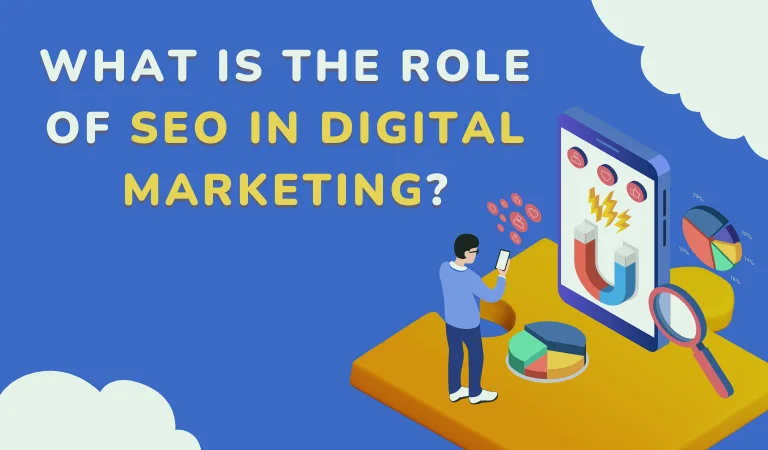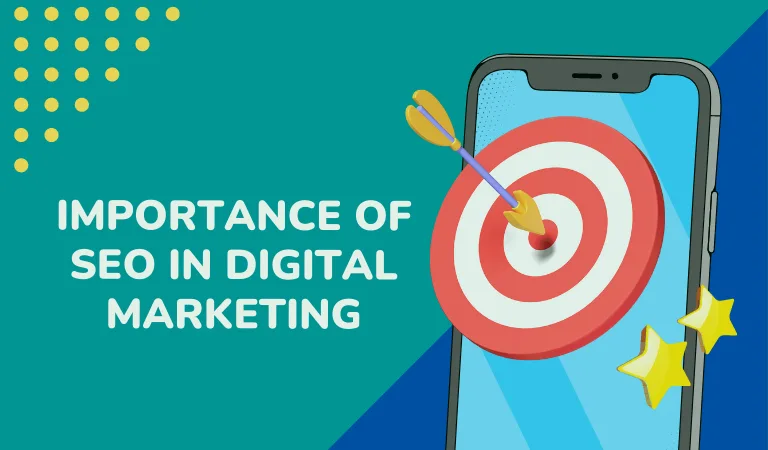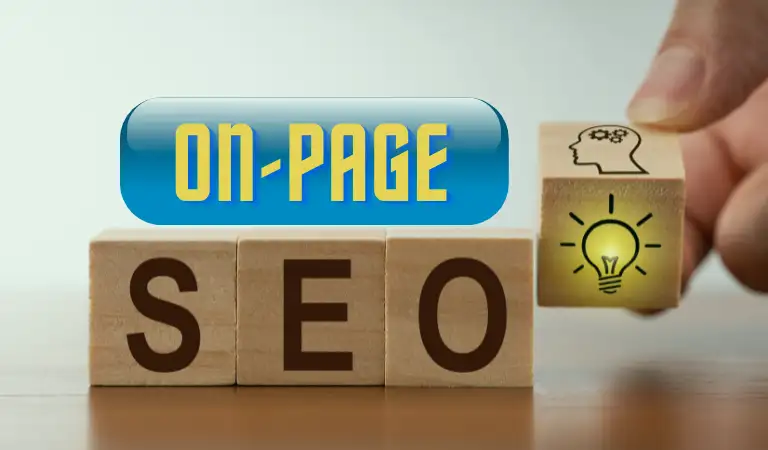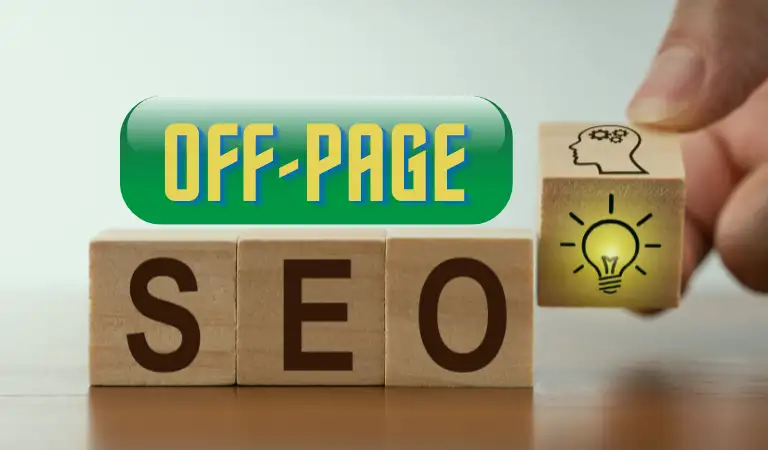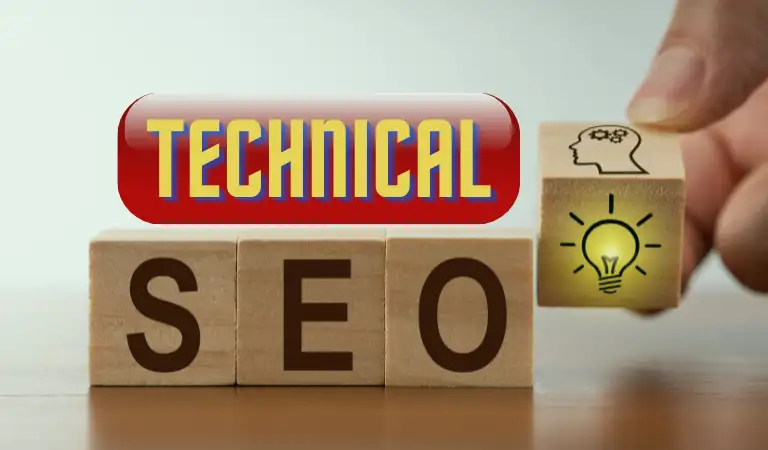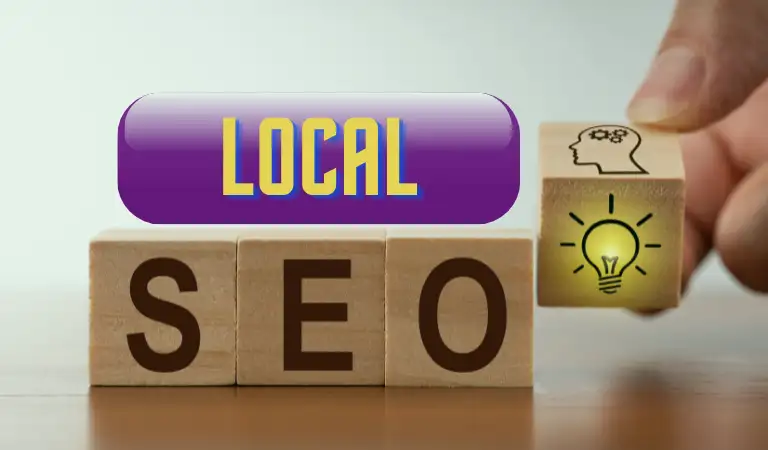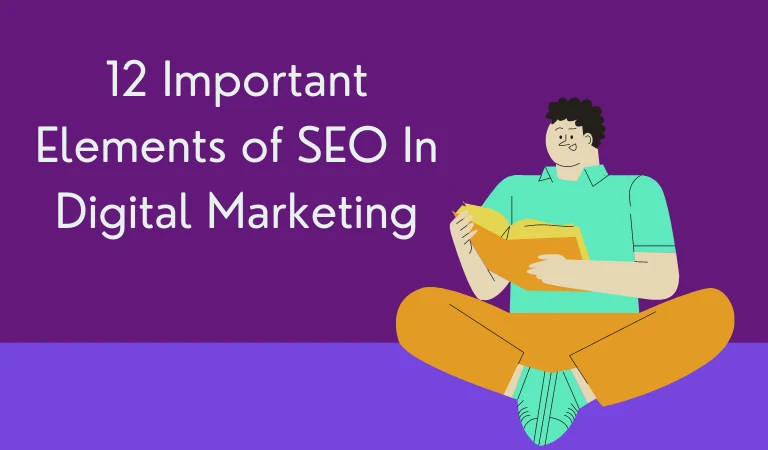SEO in digital marketing is one of the most discussed topics among digital marketers, search marketing experts, and advertisers. This is what defines an effective marketing strategy.
Nowadays, many people make a career by blogging. There are several benefits of blogging for business. Blogging necessitates the setup of a website.
Rendering a web page that is simple to locate, crawl, and classify is known as SEO (search engine optimization). Marketing is critical for every business. Whenever a company goes online, marketing is the most effective way to attract a large amount of traffic. SEO and digital marketing allow you a significant amount of free promotion.
There’s still a lot to learn about SEO. Let’s start with the basics: What is the role of SEO in Digital Marketing?
Table of Contents
ToggleWhat Is Search Engine Optimization(SEO)?
Search Engine Optimization (SEO) is the strategy to enhance your website’s exposure when consumers use Google or some other search engines to look for services or goods linked to their company.
SEO implies “organic” placement, which indicates you don’t have to spend to appear on search engine result pages. Search engines like Google or others employ bots to crawl the web, moving from site to site, gathering data about those sites, and indexing them.
To establish the order in which sites should show in the search results for a particular query, search engine algorithms scan webpages in the index, considering many ranking criteria or signals.
Search bots determine how effectively a website or web page can provide the information that the searcher is looking for.The search algorithms are intended to give audiences a quick and easy way to find information.
SEO and digital marketing may assist your site in ranking better in the search engine results. Although every algorithm examines distinct components of a webpage, like meta descriptions, page titles, hyperlinks, keyword density, and so on, they are all part of the more extensive algorithm. As search engines (primary, secondary, and targeted) alter their systems regularly, you have to be able to react to such changes if you would like to stay ahead.
Importance of SEO in Digital Marketing
Here are some of the reasons why SEO in digital marketing is so vital:
-
Rankings and Visibility
The pages that are visible throughout the first page of search engine result pages are chosen by most people. Consequently, achieving a position in the top ten articles on the result pages will aid in increasing visibility. You must optimize your website and its web pages for search engines to rank on the results page.
By raising the website’s position among other competitors, SEO makes it simpler for prospective visitors to visit the site, making it more visible. SEO enhances the number of individuals who visit the website by leveraging organic traffic. As the number of individuals who visit the website grows, the page’s rating in search engines rises.
-
Increased Web Traffic
If you want to boost your company’s revenue, you’ll need to figure out how to improve website traffic. The rise of organic website visitors is aided by SEO in acquiring new clients. If you can retain the quality of your content and deliver value to your audiences, organic traffic will stream to your website.
SEO aids your position on the top page of Google and develops a reputation for your website, increasing the likelihood of sales and profit.
-
Reliability and Credibility
Websites that appear higher in organic results appear more credible to end-users. The higher your position in SERPs, the better your SEO is. Positioning on the search results page gives you more exposure and trust with potential consumers.
The search engine’s recommendation to be in the top five results is a form of approval. Individuals depend on such websites or businesses because they know that search engines only allow high-quality content on the result pages. As a result, SEO is critical in establishing the website’s credibility and reputation.
-
Better User Experience
User Interface (UI) and User Experience (UX) are critical components of a profitable website. To observe a positive impact on your SEO, ensure the website is optimized for them.
The SEO-optimized website answers all of the fundamental inquiries, such as what product the business sells, where it’s located, how a user may purchase the goods, payment, shipping information (if relevant), etc. When you create a site that is tailored to the user’s demands, the search engine can collect the relevant information and display it to them when they ask.
Search engine optimization (SEO) focuses on search engines, whereas user experience (UX) focuses on your website’s visitors. Both have the same purpose: to provide the most excellent customer experience possible. Through user engagement data, the UX design directly impacts your SEO rankings. You’ll notice higher SEO results, brand reputation, and audience retention if you put in the effort to enhance your UX design.
-
Long-Term Growth
A well-optimized website that is frequently updated and has high-quality, helpful information is considered to attract clients and generate revenue. Search engines strive to give the best possible user experience. If your website offers the greatest answer for the query, it will be at the top of the search results. Since SEO is a constant process that you must manage, a long-term commitment to it is a much more rewarding method for success.
SEO is a continuous effort, not a one-time event. If you simply practice SEO and digital marketing for a limited time, you will only see favorable outcomes to a certain level.
-
Improves Content Strategy
Developing great content focused on the users is a vital aspect of SEO. The secret to a company’s success is the creation of high-quality content. There is a saying that content is king marketing is queen. SEO aims to improve the user experience by offering high-quality content. Creating relevant, coherent, and engaging material is essential for a successful content strategy.
How Many Types of SEO in Digital Marketing
Different SEO tactics are most important for your content and website search engine optimization. These tactics can substantially assist you in achieving a high ranking in the SERPs.Here I’ll discuss types of SEO
-
On-Page SEO In Digital Marketing
On-page SEO is optimizing individual website pages to improve their search engine rankings and generate greater qualified traffic. Optimization of title tags, contents, UX, click-through rate and dwell time, on-page content, Images size, search intention, and page loading rate are common on-page SEO tactics.
Common On-page SEO factors that search marketing experts should consider :
- Generating titles and descriptions
- Original, high-quality content
- Internal link optimization
- Optimizing images (image size, proper image names, use of ALT text)
- Structures of URLs that are optimized
- Navigation is intuitive and straightforward.
- Format text (use of bold, italics, etc.)
- H1 tag and other headers that are appropriately structured
- 404 user-friendly pages
- Webpages loading time
- Mobile-friendly websites.
On-page SEO is essential for search engine optimization (SEO) since it assists Google or search engines to determine the purpose of every piece of content on your website. The high you appear in search, the more Google appreciates your content, which equals more organic visitors, sales, and profit.
Relevance is such a vital factor of on-page SEO that you’re unlikely to rank until you master it. You must first generate content that Google will rank before performing ‘technical’ optimizations such as putting keywords here and there. You’ll need a core target keyword in mind for this. To generate SEO-friendly content, you must master four skills: relevance, thoroughness, uniqueness, and clarity.
Each webpage will be crawled by Google or another search engine. So, you have to implement an on-page SEO plan for all of your website’s pages, not simply blog entries.
-
Off-Page SEO In Digital Marketing
Off-page SEO refers to processes that take place outside of a website to improve the site’s search engine rankings. Off-page SEO effectively informs Google about what other people think of your website.
If you have a lot of excellent links going to your site, for instance, search engines will believe you have amazing content – the kind that people value.
You may utilize a variety of off-page SEO methods. Search marketing experts need to consider looking at these off-page strategies for increasing authority and organic search traffic:
- Link Building
- Local Search Engine Optimization
- brand development
- Influencer marketing
- Events
- Citation building
- Posting as a guest
- Podcasts
- Social networking
- Forums
- Reviews
- Syndication of content
Other off-page SEO methods include answering questions on Quora and connecting with the Reddit community and others. Quora is a fantastic way to interact with your audience. It’s a site wherein individuals deliberately seek solutions to their questions. If you can assist them with valuable answers while also directing visitors to your website in a non-promotional approach, you will be able to gain trust and improve your SEO.
These strategies involving SEO and digital marketing improve your website’s authority, credibility, and relevance by helping search engines and visitors better comprehend the content.
-
Technical SEO In Digital Marketing
Technical SEO is the website and server modifications that aid search engine bots in crawling and indexing your site more efficiently. Building up your website ideally so that each page operates as it should is the first extensive process of developing a technical SEO plan. This file is crawled by Google (and other search engines) to understand your website fully.
For example, if your website takes a long time to load or has a million 301 redirects, you might miss many visitors. Knowing the sections that make up technical SEO will help you avoid undertaking any website operations that hurt your overall SEO.
Technical SEO is consists of the following elements which search marketing experts need to consider :
- Structure of a Website
- Structure of the Links
- Meta Descriptions
- Friendliness and usability
- Indexability
- Image optimization
- Site loading time
- Coding
- Errors
- Schema
-
Local SEO In Digital Marketing
Local SEO is a sort of search engine optimization (SEO) that makes your company increasingly noticeable in Google’s local search results. Local SEO helps you acquire a local search region and engage with searchers in your area. In contrast, traditional SEO focuses on enhancing your site’s exposure on a nationwide or worldwide scale.
Not every business requires local SEO. Companies that serve a specific geographic region (or several) are required to appear in local searches for keyword words that prospective customers in the area are looking for.
12 Important Elements of SEO In Digital Marketing
You must have a decent SEO plan to have an effective SEO strategy. Here are some elements to consider while developing an SEO strategy:
-
Audience & Niche
When using search engines to identify businesses like yours, present or prospective clients are the intended audience. Determining who you want to attract to the website is a difficult element of an SEO strategy. You must increase customer engagement to promote and sell a product or service successfully.
Knowing your ideal clients may assist you in defining your company’s niche and, as a result, developing a strong USP (unique selling proposition) that confirms the company’s position in the market. Successful SEO necessitates a detailed grasp of the company’s operations by search marketing experts.
-
Search Intent
The fundamental purpose while investigating a question in a search engine is called search intent (also known as user intent). Google’s primary objective is to address search intent, making it a major goal for SEOs.
If a user is looking for a certain phrase and gets inappropriate results, Google receives a signal indicating the user’s purpose is likely misaligned.
You may develop your website as an authority in your industry by meeting user search intent. Giving valuable content that matches a user’s search query demonstrates to the audience that you know what you are writing and can respond to questions about the company, products, and industry.
Keywords are thoughts and ideas that determine the subject area of your article. They’re the phrases that people type in search engines, often known as “search queries” in SEO.
The first phase for search marketing experts in making a good SEO strategy is keyword research. Your website can rank better for such searches if you structure your articles with keywords that people are looking for.
Keyword research is a complex process, but it can be broken down into four simple phases.
- Create a “brainstorm” list, sometimes referred to as a “seed” list, by coming up with ideas.
- Research keywords using a keyword research tool.
- Make changes to your list as needed. Find out how frequently the searches are used to assist you in organizing your tasks.
- Examine the level of competitors in the search engine results for the selected keywords.
When optimizing a website, a marketer should think about the following factors. Such as adding the keyword in the page’s title, URL, meta tags, particularly the meta description, image file directories, alt text in pictures, and anchor text in links back to the web page from other parts of the site.
Remember that keyword relevancy is more significant than keyword density in SEO while optimizing the website pages.
Content SEO involves the production of content that aids in the high ranking of the web pages in search results. It entails anything related to creating and organizing content for your website. Content can take several forms, including webpage Content, Videos, podcasts, Ebooks and whitepapers, Blogs, Infographics, and Posts on Social Media.
Here’s a brief overview of what you’ll have to do to optimize your website content:
- It’s advisable to perform keyword analysis before writing if you would like to increase traffic via searching.
- For optimum search capabilities, understand where and how to employ keywords in your content.
- You should logically organize your website’s contents.
- Increase the exposure of relevant content you produce by publishing it on social media and establishing links.
Since search engines like Google scan every website, the keywords you put on it impact where your website will rank in the SERPs.
Search engine marketing (SEM) is a marketing approach used to improve the ranking of a website on search engine results pages (SERPs). SEM is concerned with gaining paid traffic, whereas SEO generates, tracks, and evaluates organic (unpaid) traffic trends.
Pay-Per-Click (PPC), Local, and Organic SEO are the three primary forms of search engine marketing (SEM). They’re all focused on aiding you to gain more exposure in search results.
Advantages Of Search Engine Marketing – SEM
- Instantly connect with your customers.
- Enhance your brand’s visibility.
- Develop Geotargeted Search Ads.
- Using Optimized Ads, you may reach the right audience.
- Bring traffic by increasing the visibility of your ads.
- Payment only when people take action
-
E-A-T
Expertise, authority, and trustworthiness are represented by the letters E-A-T. It originates from the Search Quality Rater Guidelines at Google. Websites that indicate expertise, authority, and reliability are valued by Google. A mix of the author, the content, and the website determines it.
Expertise
Expertise refers to a strong knowledge or proficiency in a certain field. It’s usually evaluated at the content level instead of at the website or organizational level. Google is looking for content authored by a professional in the field.
Authority
Authority is all about recognition, especially among other industry leaders and leaders. Authority is established when people see a person or a webpage as the go-to source of info on a specific issue.
Trustworthiness
Trustworthiness refers to the validity, clarity, and correctness of the website and its content. When evaluating trustworthiness, raters check for various criteria, including whether the website says who is accountable for written articles.
-
Analytics and Reporting
SEO analytics is a process of gathering and evaluating information to acquire a better knowledge of the website’s organic performance. A good SEO study may help you find crucial elements to concentrate on when it comes to improving your website visibility. It assists you in prioritizing activities, obtaining data for SEO efforts, and making smarter SEO judgments.
The effectiveness of your website’s SEO is tracked through SEO reports. It shows you which SEO marketing activities are practical (for example, identifying specific keywords for organic search) and suggests growth opportunities. Double-check that your SEO report is brief, well-organized, and pleasing to the eye. We recommend including the following three sections:
- The overview provides the customer a sneak peek into what they may expect from your SEO report.
- KPIs show how well you’re meeting your client’s objectives.
- opportunities, discuss the outcomes you’ve generated and outline the client’s next actions
The importance of analytics in SEO cannot be overstated. It may assist you in finding out if your website is optimized for search, what is driving traffic and what isn’t, and where you should put your effort and money.
-
Mobile SEO
Mobile SEO is optimizing a website for search engines while also ensuring that it can be seen flawlessly on devices such as mobile phones and tablets. You can optimize your website for search engines for desktops and mobile devices to engage with consumers on all platforms. Unlike a desktop, mobile search engine optimization (SEO) is influenced by the specified location, screen, OS version, and other factors.
The word “responsiveness” exclusively applies to a site’s layout adapting automatically to multiple screen sizes. In mobile navigation, however, several other factors must be considered, including:
- Speed: The time it takes for contents and web page components to load;
- Page size: Data usage on limiting Internet services;
- Fidelity : In terms of capability and information, closeness to the desktop version;
- UX (User Experience) includes browsing, navigating, adaptability, and more.
- Usage pattern: continuous access, but only for limited durations of time.
Even though most functional phones have increased dramatically over time, it is expected that this amount would eventually reach the number of people in the country and maintain pace with its population expansion.
Since 2015, Google has used Mobile-Friendly as a ranking factor, and its exclusion in the Search engine results page for google searches on portable devices has resulted in a loss of importance.
-
Crawling
Website crawling is the automatic acquisition of online pages by a software process with the goal of indexing website information so that it may be searched. The crawler examines a page’s information for links to subsequent pages to gather and index.
Search engines use website crawling to figure out what an individual webpage is about, letting them link millions of results pages all at once.
The search engine selects the most related articles, with the best pages showing at the top of the results page.
-
Indexing
The technique through which search engines organize something before a search to provide pretty fast responses to questions is indexing. Search engines index a web page if it has been viewed by the search engine’s crawler (“Googlebot”), assessed for content and structure, and saved in the index. Pages that Google has indexed can appear in search results (assuming they fulfill Google’s webmaster standards).
-
Straightforward Website And Quality Content
The layout of your website is vital to overall SEO techniques. The design of your website informs Google about the most significant pages on your site. This implies you may affect what content ranks higher in search engines by changing the website’s layout.
It aids search engines in determining what your site’s primary purpose is or what you’re offering. A good site structure also makes it easier for search engines to discover and index content.
So, The primary goals are to create a user-friendly website with easy navigation, SEO terms, appropriate Meta tags and title tags, and a proportionate keyword density in quality, meaningful, and persistent content. The material on each page should be original and non-plagiarized, and it should be constructed around the keyword topics. You should also avoid keyword stuffing.
-
Social Sharing
The more links you post throughout social media platforms, the more visibility your brand gets. It has six significant impacts on search engine optimization when combined:
- Content sharing on a large scale.
- Your postings will be more durable.
- Maximize your website’s organic traffic and visibility.
- Strengthen the image of your company.
- Elevate the brand’s reputation.
- Enhances the quality of local search engine optimization (SEO).
Social media marketing indirectly influences search engine optimization. You can explore Keys To Successful Social Media Marketing to strengthen your strategies.
The use of social media is not a factor in SEO rankings. However, the more helpful material you publish on social media, the more likely the audience will share this with its friends and supporters.
As a result, numerous others may link to the postings as the sharing continues. The shared content may help your blog’s exposure and SEO score.
What Is The Role Of SEO In Digital Marketing?
Digital marketing is a broad marketing method that covers various marketing strategies. It’s a way of marketing that makes use of digital resources to promote a company, product, or service. Digital marketing is much more about selling and buying goods and services. It provides entertainment, social connection, news, customer exposure to a brand, and other things.
Digital marketing includes subcategories such as social engine optimization, search engine marketing(SEM), content automation and marketing, e-commerce marketing, social media marketing(SMM), Pay – per – click, display advertisements, email marketing, etc.
Search engine optimization is an essential part of digital marketing. SEO and digital marketing is in charge of boosting your website’s exposure and keeping you ahead of the competition. It improves the visibility of a website, visitor engagement, conversion rate, and return on investment.
Final Words
The algorithms are constantly evolving, presenting you with new difficulties. Search engine optimization is a never-ending activity. Search engines, too, have created diverse regulations due to shifting online client behavior. So search marketing experts needs to consider various aspects
Now you understand the importance of SEO in digital marketing. If you operate an internet business, there are no other options than to optimize your website for search engines with SEO and digital marketing.
FAQ’s
Why is SEO important for digital marketing?
SEO is made up of various factors, and knowing what they are and their process of work is important to determining why SEO is so important. In a word, SEO is vital since it raises your site’s exposure, which indicates more visits and a better chance of converting leads into buyers.
How is SEO used in marketing?
SEO (search engine optimization) aids in ranking your website at the top of search engine results. The following is a list of how SEO is utilized in marketing:
-
- Publish content that is both relevant and authoritative
- Keep upgrading your content
- Include metadata
- Get a site that is worth linking to
- Make use of alternative tags

